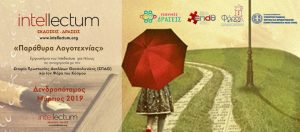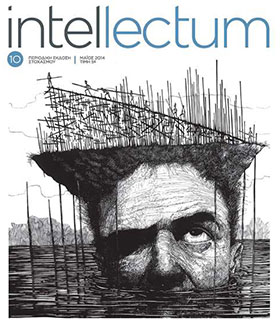On Friday 17th March 2006, at 17:00-19:00 pm a teleconference on the future of Europe took place in the Building of the Hellenic Telecommunication Organization in Thessaloniki where young people from Thessaloniki, Belgrade, Leukosia and Turk citizens living in Europe participated.
This event was the continuation of the interesting open conversation on Europe organized by the British Council of Thessaloniki in February 2006 in the Royal Theatre of Thessaloniki, where Victor Tsilonis and Diamantis Kryonidis participated, representing the Intellectum Scientific Society.
The event was quite unique for Thessaloniki and the Intellectum Scientific Society is looking forward to assist in similar activities in the future.
The central theme of the conversation, which was interesting as well as intense at times, was the concept of cultural diversity and its various expressions and characteristics in Europe.
During the teleconference it was stressed that different elements of culture as language, nationality, religion, social class, political system, etc. define what we call cultural difference. Cultural difference can also be defined according to other elements which constitute the common background between certain people and differentiate a lot human societies.
Another issue of discussion was the influence of cultural differences in the European Union. We felt that, despite the differences, we have many things in common. Nowadays, there are problems caused by the new ‘cultural elements’ which are integrated in the E.U. because of the recent incorporation of ten new states. Consequently, the fear ‘for the others’ has been increased and more incidents of xenophobia and religious racism have occurred.
Moreover, the evolution of the cultural ‘conflict’ concerning the perspective of the EU enlargement was also discussed. Everyone agreed that undoubtedly this situation hinders the progress of the European integration as there is need for more time to comprehend and accept our differences.
Finally, the conversation was led to future scenarios and the potential of assumption of forms of action by the E.U. itself. As far as the first issue is concerned, the entrance of new states will bring new changes, new elements and new challenges. The E.U. imposes as a minimum standard the respect of other people’s rights and, hence, can take special measures in order to stop racist points of view and reinforce comprehension of other people’s differences. Eventually, it was agreed that confronting these issues demands constant alert.
Generally, it can be argued that in every society and every era the fear of new is evident. The E.U. however, can develop common views on issues concerning culture and education as well as actions which will focus on understanding others, respect and excluding fear of ‘other’ cultural expressions.
Apart from the aforementioned issues, there was a heated discussion on some views of individuals mainly from the Thessaloniki group. In other words, there were doubts concerning the extent to which the E.U. actually promotes cultural differences and the respect of human rights when it is prohibited for instance for one to wear a burga in European universities while one is allowed to be dressed as a punk at the same time.
Additionally, Turkey’s accession to E.U. was considered as problematic, because Turkey has yet to practically adopt the minimum human rights standards supported by the E.U. and does not even allow the free commerce between the EU member states (cf. the example of Cypriot commercial ships), nor the function of traditional Christian schools such as the famous Theological School of Halki.
The aforementioned points created a fertile ground for debate between young Christian and Muslims. We gladly saw that this debate was extremely polite and reached a hopeful end, proving once more that the true desire for dialogue is of utmost important in order to lead to satisfactory and commonly accepted solutions.
To sum up, via our participation in the teleconference we discovered that meetings like these can activate young people and thus should be held more often. All the participants of the Intellectum Scientific Society feel excited and hope that there will soon there be more similar events allowing free participation.

